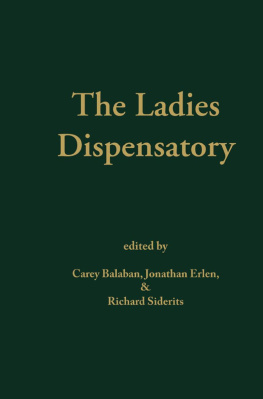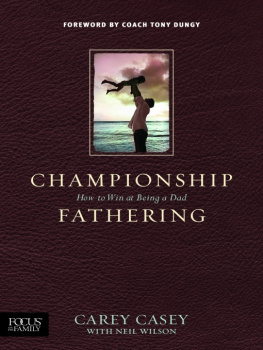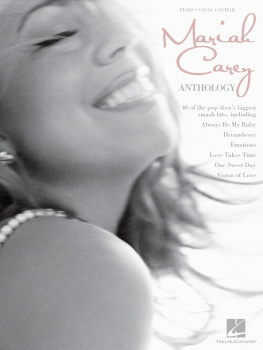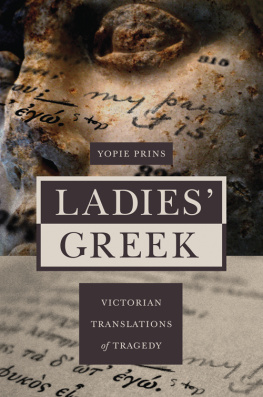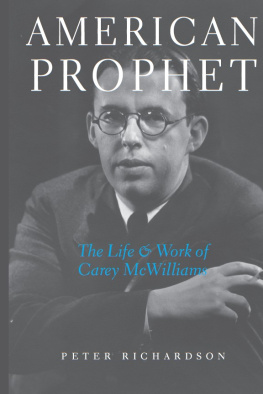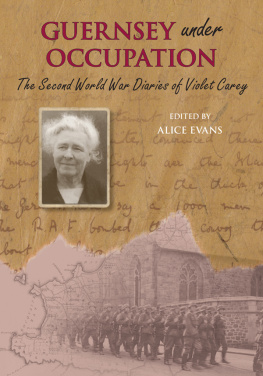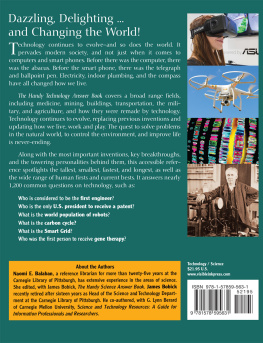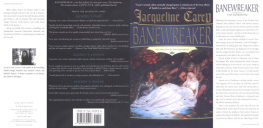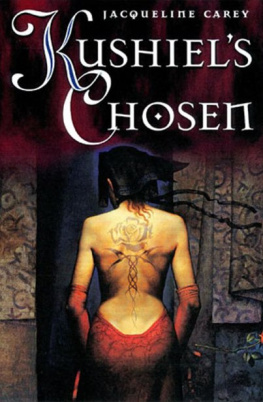SOURCE: Ambroise Par,
Les uvres dAmbroise Par, Conseiller et Premier Chirurgien du Roy, Neufiesme Edition. (Lyon: Claude Rigaud et Claude Obert, 1633)
THE LADIES DISPENSATORY
Containing
The Natures, Vertues, and Qualities of all HERBS, and SIMPLES usefull in Physick.
Reduced
Into a Methodicall Order, for their more ready use in any sicknesse, or other accident of the Body.
The like never published in English.
WITH
An Alphabeticall Table of all the Vertues of each Herb and Simple.
London. Printed for R. Ibbitson, to be sold by George Calvert at the halfe-Moon in Watlingstreet. 1652.
EDITED BY BALABAN, ERLEN, & SIDERITS
First published in 2003 by
Routledge
711 Third Avenue,
New York, NY 10017, USA
www.routledge-ny.com
Published in Great Britain by
Routledge
2 Park Square, Milton Park,
Abingdon, Oxfordshire OX14 4RN
www.routledge.co.uk
First issued in paperback 2016
Routledge is an imprint of the Taylor and Francis Group, an informa business
Copyright 2003 by Taylor & Francis Books, Inc.
All rights reserved. No part of this book may be reprinted or reproduced or utilized in any form or by any electronic, mechanical, or other means, now known or hereafter invented, including photocopying and recording, or in any information storage or retrieval system, without permission in writing from the publishers.
Library of Congress Cataloging-in-Publication Data
Sowerby, Leonard.
The ladies dispensatory/[Leonard Sowerby]; edited by Carey Balaban, Jonathan Erlen and Richard Siderits
p. cm.
Includes bibliographical references.
ISBN 0-415-93533-4 (hb.)
1. TherapeuticsEarly works to 1800. 2. Materia medicaTherapeutic useEarly works to 1800. 3. HerbsTherapeutic useEarly works to 1800.4. Medicine, Popular Early works to 1800. 5. WomenHealth and hygieneEarly works to 1800. I. Balaban, Carey David, 1954- II. Erlen, Jonathan. III. Siderits, Richard, IV. Title.
RM84.S69 2002
615. 1094209032dc21
2002028483
ISBN 13: 978-1-138-97415-9 (pbk)
ISBN 13: 978-0-415-93533-3 (hbk)
Acknowledgements
The editors wish to thank Toby A. Appel, Historical Librarian, Cushing/Whitney Medical Library, Yale University, and her library for loaning their original copy of The Ladies Dispensatory for this project. Some of the illustrations were reproduced from a copy of the 1633 edition of John Gerards The Herbal or General History of Plants in the collection of the Hunt Institute for Botanical Documentation at Carnegie Mellon University. The editors thank Charlotte Tancin, Librarian and Senior Research Scholar, for making this material available for our use. The other illustrations were reproduced from a 1633 edition of Les uvres dAmbroise Par, Conseiller et Premier Chirurgien du Roy ([Ninth Edition], Lyon: Claude Rigaud et Claude Obert, 1633), except for a variant on the illustration of aconite from the 1634 edition of The Workes of that Famous Chirurgion, Ambroise Parey, translated by Thomas Johnson (London: Thomas Coates and R. Young, 1634); copies of both works are from the collection of the Falk Library of the Health Sciences, University of Pittsburgh. We wish to thank John Symons of the Wellcome Institute of the History of Medicine in London for his assistance in locating biographical information about Leonard Sowerby. This work is dedicated to the editors wives, without whose support and understanding this project would not have been completed: Naomi Balaban, Judith Ann Erlen, and Nancy Obis Siderits.
Introduction
In seventeenth-century England, primary health care was most commonly provided by a variety of lay people, including domestic healers (mothers, fathers, and housewives), local wise women, clergymen, midwives, and gentlewomen.1 During the Protectorate of Oliver Cromwell (164859), there was an outpouring of self-help medical publications for the lay public in England. In contrast to the period between 1640 and 1648, when only 15 significant popular medicine titles were published, Charles Webster2 documents the publication of 163 self-help titles in English during the period between 1649 and 1659. This flurry of activity reflects a major surge of public interest in both medicine and preventive health among the literate public, who could be cast in the roles of both lay patients and health-care providers.
The role of health-care provider required the self-help practitioner to both diagnose the disease and prepare the appropriate medicines. Since remedy texts such as Leonard Sowerbys The Ladies Dispensatory (1652) do not discuss diagnostic criteria, one must presume that the nosology of the disorders was either common knowledge or based on well-established texts such as Andrew Boordes Breviary of Helthe (1547).3 Once the diagnosis was determined, the medication could then be selected from the list of remedies, that were gleaned from four earlier authorities4: Gerard with Johnson,5 Gorus, Fuchsius, and Dioscorides. In this sense, Sowerbys readership could be characterized as practitioners of Empirical Medicine, defined by Steven Blancard [Blankaart] (Professor of Physic from Middleburg in Zealand from 1650 to 1702) as:
Empirica Medicina, Quacking, curing the sick by guess, without Reason, the Use of Anatomy, or knowing the Causes of Distempers, but to certain Symptoms only prescribd such Medicines as they had experienced in such like cases before.6
However, it is important to note that, unlike alternative or popular self-help remedies in our contemporary society, that often deviate from modern, standard medical practice, the self-help patient of mid-seventeenth-century England received Empiricist remedies that were consistent with standard medical practice of that day (e.g., Pharmacopia Londinensis7).
The popularity of remedy texts in mid-seventeenth-century England suggests a wide acceptance of self-help medicine among the lay public. Insight into the popularity of self-help medication can be gleaned from contemporaneous utopian works. For example, Samuel Hartlibs Macaria (1641), in a dialogue between a Traveler and a Scholar, described the ideal of combining the functions of an Empiricist Physician and a Parson to cure both body and soul:
Sch. But you spoke of health, how can that be procured by a better way than wee have here in England?
Trav. Yes very easily; for they have a house, or Colledge of experience, where they deliver out yeerly such medicines as they find out by experience; and all such as shall be able to demonstrate any experiment for the health or wealth of men, are honourably rewarded at the publike charge, by which their skill in Husbandry, Physick, and Surgerie, is most excellent.
Sch. But this is against Physicians.
Trav. In Macaria the Parson of every Parish is a good Physician, and doth execute both functions, to wit, cura animarum, & cura corporum; and they think it as absurd for a Divine to be without the skill of Physick, as it is to put new wine into old bottles; and the Physicians being true Naturalists, may as well become good Divines, as the divines do become good Physicians.



